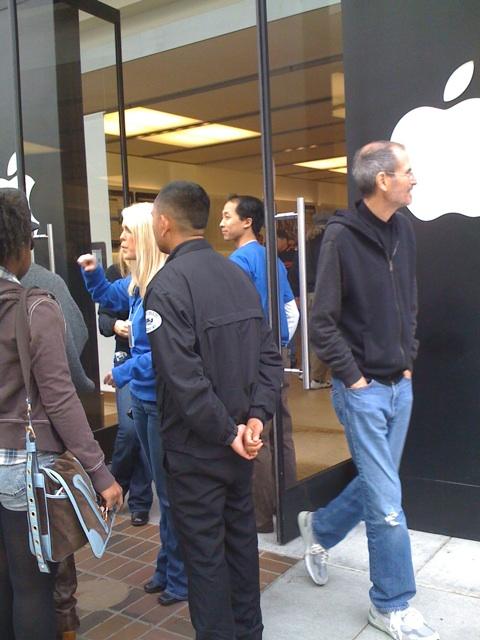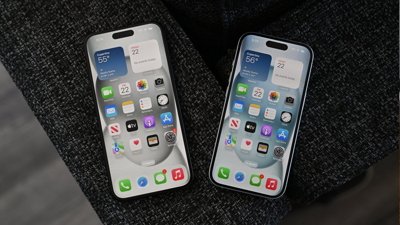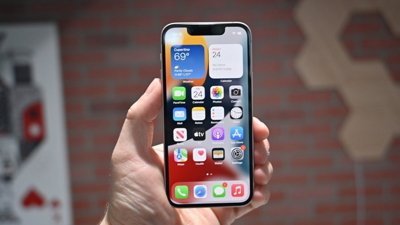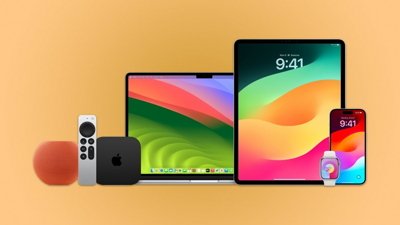From one leave to another: Steve Jobs steers Apple's most successful era ever
June 2009 - Jobs returns to work
Jobs last left Apple in January 2009, a six-month leave of absence that was due to "complex health issues." The last time, as is the case in his current hiatus, Chief Operating Officer Tim Cook was left in charge.
Jobs returned to work in June 2009 after he underwent a liver transplant at Methodist University Hospital in Tennessee.
The Apple co-founder wasted little time to return to the stage for one of his trademark keynotes in September 2009. It was his first public appearance in nearly a year, earning Jobs a standing ovation at the Yerba Buena Center for the Arts in San Francisco.
"I'm very happy to be here today with you all," Jobs said in 2009. "As some of you know, about five months ago I had a liver transplant. I now have the liver of a mid-20s person who died in a car crash and was generous enough to donate their organs."
"I am alive because of their generosity," he added. "I hope we all can be that generous. I'd like to thank everyone in the Apple community for their concern. It means a lot. I'd like to thank Tim Cook, and everyone at Apple who rose to the occasion. Thank you guys."
Jobs' appearance in September 2009 would prove to only be a teaser for the real main event to come.
Steve Jobs was spotted back on Apple's campus in June 2009 by TMZ.
Jan. 2010 - Introducing the iPad
Buzz continued to build for months that Apple was planning to release a touchscreen tablet and spiritual successor to the Newton. That speculation reached a fever pitch in early 2010, when Apple sent out invitations teasing that it would unveil a new product to the masses.
At a keynote on Jan. 27, 2010, Jobs again took the stage to unveil the iPad. One report alleged that Jobs believes the iPad is the most important thing he's ever done in his storied career at Apple.
Jobs would later explain that he believes the iPad and devices like it will bring about the transition to a post-PC era, where new form factors and smaller devices will represent most users' computing needs.
The Apple co-founder recalled that the U.S. automobile industry was previously dominated by larger trucks, which were driven by farmers. But smaller, more compact cars became more popular as cities grew and features like power steering and automatic transmission were added to the cars.
"PCs are going to be like trucks," Jobs said, noting that they will still be around, but will represent a smaller number of people.
It took little time for the iPad to exceed the Mac in terms of sales. In just its second quarter of availability, the iPad bested the Mac, as Apple sold 4.19 million of its tablet, versus 3.89 million of the Mac.
April 2010 - Jobs slams Adobe Flash
Jobs' disdain for Adobe Flash was no secret, but in April 2010 he laid his opinions bare for all to see in an open letter he published on Apple's website. In it, he slammed the browser plugin as unfit for the modern era of computing.
The comments served to justify why Flash has not been allowed on Apple's mobile devices powered by the iOS operating system, like the iPhone and iPad. Jobs said that Flash is inefficient in consuming system resources, leading to shorter battery life on mobile devices.
He said that the poor performance of Flash on traditional computers has proven that Adobe's application runtime should not be allowed on iOS devices.
"Flash is the number one reason Macs crash," Jobs wrote. "We have been working with Adobe to fix these problems, but they have persisted for several years now."
Adobe's Chief Executive responded to Jobs' comments, calling them a "smokescreen" for problems that he believes are the fault of "the Apple operating system." Shantanu Narayen said he believes multi-platform options like Flash will "eventually prevail" because they allow developers to write software that can be used on a number of devices.
May 2010 - Apple passes Microsoft on Wall Street
In a major symbolic milestone for Apple, the Cupertino, Calif., company surpassed Microsoft in terms of market capitalization on May 26, 2010. Apple dethroned its rival to the north to make it the second largest American company, and the largest technology company in the world.
With Microsoft in its rear view mirror, Apple's stock continued to grow, and earlier this month passed the $300 billion milestone. That came just three and a half years after AAPL stock broke the $100 billion barrier.
Jobs' contributions to his company's financial success did not go unnoticed. In the 18 months between his medical leaves of absence, he was named "CEO of the Decade" by both Fortune and MarketWatch. He was also named the Financial Times Person of the Year, in a profile that called his presentation unveiling the iPad a cap to "the most remarkable comeback in modern business history."
When asked about Apple surpassing Microsoft, Jobs called the milestone "surreal," but said that achievements like that aren't what makes him come to work in the morning. "It doesn't matter very much," he said. "It's not what's important."
June 2010 - iPhone 4: success in the face of adversity
Last June, Apple issued its annual update for the iPhone, its best-selling smartphone, with a new model packing a high-resolution display and two cameras. The iPhone 4 proved to be the most successful handset yet, breaking sales records and pushing Apple's revenues even higher. But the handset wasn't without its share of controversy.
Before the phone was even unveiled, a prototype of the device was lost at a bar, and tech blog Gizmodo got their hands on it. The website disassembled the iPhone and confirmed it was made by Apple, and the situation prompted a criminal investigation.
Interviewed at the All Things D conference in June, Jobs noted that there was a "debate" as to whether the Apple employee that lost the prototype had mistakenly left it behind, or if it was stolen from his bag.
"This is a story that's amazing: it's got theft, it's got buying stolen property, it's got extortion," Jobs said. "I'm sure there's some sex in there."
Controversy over the iPhone 4 continued after the handset's launch, when it was discovered that covering the bottom left side of the phone could cause reception issues with the antenna. The issue gained so much attention that Jobs was forced to hold a press conference in July 2010, at which he revealed his company would give away free cases for all buyers through Sept. 30.
The company also said that iPhone 4 owners unhappy with their purchase could return the handset within 30 days undamaged for a full refund.
"We want to take care of everyone," Jobs said at the press conference. "We want every user to be happy."
Apple's temporary case giveaway largely quieted concerns about the iPhone 4 antenna. In the company's September 2010 fiscal quarter, Apple sold a record 14.1 million iPhones, an increase of 91 percent over the same period a year prior.
And iPhone sales are only expected to accelerate as Apple adds more carrier partners in the U.S. and abroad. Earlier this month, Apple unveiled a CDMA variant of the iPhone 4 that will launch on Verizon's network in the U.S. on Feb. 10. That phone is also expected to debut in China, Japan and South Korea.
Oct. 2010 - Celebrating Apple's first $20B quarter
Jobs surprised Wall Street in October of last year, when he made an unexpected appearance on his company's quarterly earnings report conference call. Jobs usually does not appear during his company's earnings calls.
"I couldn't help dropping by for our first $20 billion quarter," Jobs said after his company reported record revenue of $20.34 billion. "I'd like to chat about a few things and stay for the Q-and-A."
His appearance proved to be eventful, as he slammed rival companies like Research in Motion, which he said he didn't see catching up to the iPhone at any point "in the foreseeable future." He also argued that unlike Microsoft's Windows, where PCs have the same interface, Android is fragmented because handset makers like HTC and Motorola install proprietary user interfaces to differentiate themselves.
Jobs also put down tablets with a 7-inch form factor that are smaller than the iPad. He said manufacturers like RIM, which plans to release its 7-inch PlayBook this year, have opted for the smaller screen size solely to cut costs and compete with the $499 starting price of Apple's iPad.
The co-founder of the Cupertino, Calif., company even quipped that makers of tablets with smaller form factors would need to ship sandpaper with their devices, so users could file down their fingers to the point where they could hit smaller targets on the screen.
Unsurprisingly, Jobs' comments caused controversy and prompted responses from Apple's rivals. In particular, RIM countered that problems with the 7-inch form factor for tablets only exist inside of Apple's "distortion field."
Jan. 2011 - Jobs leaves as new products loom
Monday's announcement marks the second time in two years that the chief executive will leave his post for medical reasons. And despite all that Jobs and Apple have done in the 18 months since his return in June 2009, the company shows no signs of slowing down.
Earlier this month, Apple and Verizon announced a new CDMA version of the iPhone 4 that will launch on the largest wireless network in the U.S. Feb. 10. But Apple did not host the event — Verizon did, in New York City — and it was Apple's Cook who appeared onstage, not Jobs. Earlier reports had suggested that Jobs could make an appearance.
Jobs was also rumored to appear onstage with News Corporation Chief Executive Rupert Murdoch at an event this week. The two were reportedly set to introduce a new tablet-only newspaper dubbed The Daily, as well as recurring software subscriptions on the iOS App Store. But that alleged event was reportedly delayed last week.
Then, just a few days later, Jobs announced to his employees that he will take a medical leave of absence, though he will remain CEO and will be involved in major strategic decisions. Cook will handle the company's day to day operations as Jobs takes time off for unspecified health reasons.
Cook will oversee the launch of the Verizon iPhone, and will also likely oversee the new application subscription plan, rumored to be a part of iOS 4.3, for launch in the coming months. And rumors of a second-generation iPad and iPhone 5 are picking up steam as those products head toward an expected introduction in the first half of 2011.
 Neil Hughes
Neil Hughes















 Malcolm Owen
Malcolm Owen
 Amber Neely
Amber Neely

 William Gallagher
William Gallagher


 Andrew Orr
Andrew Orr
 Christine McKee
Christine McKee







